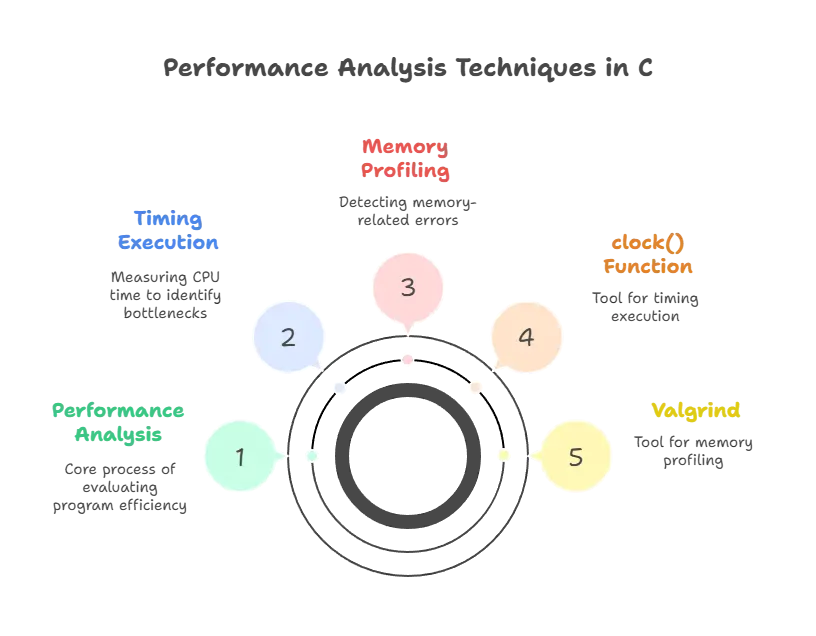Performance analysis and Profiling
In the realm of programming, especially in systems programming languages like C, performance plays a crucial role. Performance analysis and profiling are essential techniques used by developers to understand and optimize the efficiency of their code. This section provides a foundational understanding of these concepts.
What is Performance Analysis?
Performance analysis involves examining the runtime behavior of a program to identify areas that can be optimized for better speed, memory usage, or other resource utilization metrics. It helps developers understand how their code performs under different conditions and work towards improving its efficiency.
Importance of Performance Analysis
Efficient code not only enhances user experience but also reduces resource consumption, leading to cost savings and better scalability. Performance analysis allows developers to pinpoint bottlenecks and make informed decisions to optimize their codebase.
What is Profiling?
Profiling is a technique used to measure various aspects of a program’s execution, such as time spent in different functions, memory usage, and frequency of function calls. It provides valuable insights into the runtime behavior of a program, helping developers identify performance bottlenecks.
Basic Techniques for Performance Analysis
This section explores fundamental techniques and tools used for performance analysis in C programming.
Timing Execution with clock()
The clock() function in C allows developers to measure the CPU time consumed by a program. By recording the start and end times around specific code segments, developers can calculate the execution time and identify performance-intensive areas.
#include <stdio.h>
#include <time.h>
int main() {
clock_t start, end;
double cpu_time_used;
start = clock();
// Code segment to be measured
// Example: a loop
for (int i = 0; i < 1000000; i++) {
// Some computation
}
end = clock();
cpu_time_used = ((double) (end - start)) / CLOCKS_PER_SEC;
printf("CPU time used: %f seconds\n", cpu_time_used);
return 0;
}
// output //
CPU time used: 0.015000 seconds
Memory Profiling with Valgrind
Valgrind is a powerful tool for memory profiling in C. It helps detect memory leaks, uninitialized memory usage, and other memory-related errors that can impact performance.
sudo apt-get install valgrind
valgrind --tool=memcheck ./your_program

Advanced Techniques for Performance Analysis
This section delves into advanced techniques and methodologies for performance analysis in C programming.
Instrumentation: Instrumentation involves modifying the source code or binary of a program to collect runtime performance data. This data can include function call counts, execution times, and memory usage. Instrumentation frameworks like Perf can provide detailed insights into program behavior.
Cache Profiling : Understanding cache behavior is crucial for optimizing performance in C programs, especially in systems programming where memory access patterns greatly affect performance. Cache profiling tools like Cachegrind can simulate cache behavior and identify cache-related bottlenecks.
Real-world Examples and Case Studies
To solidify the concepts discussed earlier, let’s explore some real-world examples and case studies where performance analysis and profiling were crucial in optimizing C programs.
Case Study: Optimizing Matrix Multiplication
Consider a scenario where a C program performs matrix multiplication. Optimizing this operation can significantly improve the performance of various scientific computing and machine learning algorithms.
#include <stdio.h>
#define N 1000
void matrix_multiply(int A[N][N], int B[N][N], int C[N][N]) {
for (int i = 0; i < N; ++i) {
for (int j = 0; j < N; ++j) {
C[i][j] = 0;
for (int k = 0; k < N; ++k) {
C[i][j] += A[i][k] * B[k][j];
}
}
}
}
int main() {
int A[N][N], B[N][N], C[N][N];
// Initialize matrices A and B
// Perform matrix multiplication
matrix_multiply(A, B, C);
return 0;
}
By utilizing performance analysis techniques like profiling and timing execution, developers can identify opportunities to optimize the matrix multiplication algorithm, such as loop unrolling, cache optimization, and parallelization.
Case Study: Memory Profiling in a Database Management System
In a database management system written in C, memory management plays a critical role in performance optimization. Memory leaks or inefficient memory usage can degrade system performance over time.
By employing memory profiling tools like Valgrind, developers can detect memory leaks, invalid memory accesses, and other memory-related issues that could impact the performance and stability of the database management system.
Best Practices for Performance Optimization
This section outlines best practices and strategies for effectively optimizing C programs for performance.
Understand Your Requirements
Before optimizing for performance, it’s essential to understand the specific performance requirements of your application. Focus on optimizing critical sections of code that have a significant impact on overall performance.
Profile Early and Often
Integrate performance analysis and profiling into your development workflow from the early stages of development. Regularly profile your code to identify performance bottlenecks and address them promptly.
Use Optimizing Compilers
Utilize optimizing compilers like GCC or Clang, which can perform various optimizations during compilation, such as loop unrolling, inline expansion, and instruction scheduling.
Employ Data Structures and Algorithms
Choose appropriate data structures and algorithms tailored to the requirements of your application. Optimize data access patterns and minimize unnecessary memory allocations to improve performance.
Parallelize Computation
Explore opportunities for parallelization using techniques like multi-threading or SIMD (Single Instruction, Multiple Data). Parallelizing computation can leverage multi-core processors to achieve significant performance gains.
Performance analysis and profiling are indispensable tools for optimizing C programs. By understanding the fundamentals of performance analysis, employing advanced techniques, and following best practices, developers can create high-performance C programs that meet the stringent demands of modern computing environments. Continuous optimization and vigilance are essential to ensuring that C programs deliver optimal performance while effectively utilizing system resources. Happy coding!❤️
